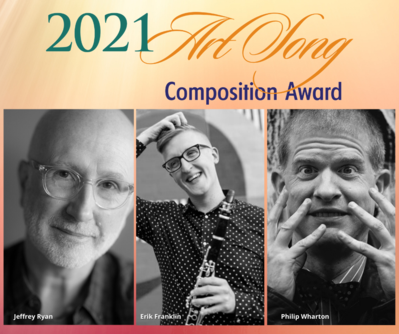What's New > Q&A with the 2021 Art Song Composition Award Winners
 |
Recently, NATS named three winners for its annual Art Song Composition Award. The 2021 first prize winner is Jeffrey Ryan, and the two second prize winners are Erik Franklin and Philip Wharton. Read the full announcement here.
The composers answered a few additional questions about their compositions for NATS.
First Prize | Jeffrey Ryan | “Everything Already Lost”
Bill Evans: Alone
Autumn Again
Night Music
Schumann: Fantasie, Op. 17
When did you first learn about NATS and this competition? Have you entered or been a finalist before?
Knowing lots of singers, I couldn’t tell you a time I didn’t know about NATS. The competition, I’ve known about for a long time but it’s only the last few years that I’ve had new art song projects that could be submitted. My mezzo cycle Miss Carr in Seven Scenes, commissioned by Canadian Art Song Project and based on the diaries of Canadian artist Emily Carr, was a finalist in 2019.
Perhaps this is like picking a favorite child, but do you have a favorite song from “Everything Already Lost”? If so, which one and why?
That’s an impossible question to answer! Each song is very much its own world. I’m really happy with the jazz inflections of Bill Evans: Alone, the rhythmic play of Autumn Again. There is a moment in Night Music where Tyler Duncan, who sang the premiere, gave the most exquisite shape to the line “shifting a little in some breeze” — when he and Erika Switzer perform that movement, it gives me goosebumps. And the final song based on Schumann’s Piano Fantasy has such drama and sweep in performance, they just take me away. It’s a wonderful thing when I can be so caught up in the performance that I stop thinking like the composer.
Have you been in touch with Jan Zwicky? What was her response in her words being set to music?
Oh, yes. I met Jan Zwicky, who lives here in BC, in 2017 when she did a reading as part of a concert by the Postmodern Camerata here in Vancouver. The programme included a piece of mine for chamber choir and string quartet. I was so deeply struck by her poetry, bought one of her books, and chatted briefly with her. She is also a violinist, and there is so much music in her poetry, both in lyricism and in direct reference to musical works. I knew that I wanted to set her words someday. When [baritone] Tyler [Duncan] and [pianist] Erika [Switzer] (who are originally from BC) approached me about the commission, wanting to have something that reflected BC as “home,” I put them onto Jan’s work, and they were as excited as I was about so many of her poems. When I reached out to Jan to request permission, she’d had poetry set to music before, and as a musician herself, knew what was involved, which made it very easy to work out the details. She and I were both a little unsure at first how the Schumann poem would work out, because it is so rich and epic, and also references Beethoven’s An die ferne Geliebte (which the Schumann fantasy also does), but the more I dug in, the clearer it became. She was able to watch the premiere performance online, and, I am relieved to say, loved it.
Do you have any words of advice or wisdom for students who would like to be a composer “when they grow up”?
Well, first off, believe that it’s possible, and get writing! The best way to become a better composer is to experience your music as an audience member. So start out by writing for your friends — they will perform your music and be honest with their advice. Always be willing to step out of your comfort zone, to not just do what comes easily to you. No matter what level of experience you have, include in every piece something you aren’t 100 percent sure will work — and have a Plan B in mind in case you hear it in rehearsal and it really didn’t work! Taking those risks is how we expand our skills and grow as composers and expressive artists.
Anything else you’d like to add?
Tyler Duncan and Erika Switzer will be recording Everything Already Lost later this year for a CD of Canadian art song (they recently released an art song CD of English poetry set by French composers). Canadian Art Song Project is currently working on a full-length recording of three cycles Miss Carr in Seven Scenes, Of Passion’s Tide, and Found Frozen, but of course the pandemic hit The Big Pause Button in the middle of it.
Second Prize | Erik Franklin | “Verses for Children”
The Crescent Moon
Wind
Sea Shell
Climbing
The Trout
When did you first learn about NATS and this competition? Have you entered or been a finalist before?
I have known about NATS for a long time — many friends in school had auditioned for the various regional competitions and attended conferences, but I learned about the NATS art song composition competition just this year (on the American Composers Forum Website). When I began composing in April 2020, I thought a good way to motivate myself to finish pieces would be to give myself a goal and a deadline. Competitions like NATS are a perfect way to set some goals and try to stick to a timeline. I’d never entered the NATS competition before — or any composition competition, for that matter — so this was my first experience of the kind!
How did you decide on using Amy Lowell’s words for your song cycle?
My friend (also a composer) introduced me to American Imagist poets last year. It seems Amy Lowell, Sara Teasdale, and their contemporaries are favorites for vocal/choral composers! I found Sea Shell first and was captivated by the text. I think it is especially fun to find poems about singing to transform into song — the line “sing me a song, o please!” absolutely begs to be sung. Anyway, when I decided to enter the NATS Art Song Composition Award competition, I knew I wanted to use my “Sea Shell” setting — and I was fortunate to find its companion poems in Lowell’s collection, Verses for Children. Many of these fit naturally with a musical accompaniment (as all children’s verses do) — and with a poem entitled “Trout,” how could I miss an opportunity to pay homage to the King of Song himself?! (If you pay close attention to the piano in “Trout,” you can hear quotes from Schubert’s Die Forelle.)
Did you have a chance to premiere the cycle online in 2020? Tell us a little about your recording process.
Since all of these songs were composed in 2020 (April and later), I haven’t heard them in public yet! The recordings on my SoundCloud (the same I sent to the NATS competition) were recorded by a lovely Baltimore-based soprano, Melissa Wimbish*. My husband recorded the piano parts on our Yamaha P-45 electric piano into Logic Pro, and I sent Melissa essentially a glorified Karaoke track. For some of the trickier ensemble things (a few fermatas, etc.), we added a separate click track. Melissa recorded her part with her home recording set-up and sent me the vocal-only files, which I combined with the piano track (minus the clicks!). It was quite a lot of planning, but Melissa’s awesome recordings made the process very smooth, indeed (especially for having never met in person!).
These are my very first art songs, and indeed my first professional compositions—so hearing Melissa sing Ms. Lowell’s words to my music — even virtually — was a powerful, emotionally moving experience! I’ll never forget anxiously awaiting her first take and hearing “Crescent Moon” for the first time — best email I’ve ever received!
*Melissa, coincidentally, is a previous winner of the 2014 NATS Artist Awards.
Do you have any words of advice or wisdom for students who would like to be a composer “when they grow up”?
YES. My advice would be to do it. Do not wait until you “learn enough.” Do not wait until you “achieve enough.” Do not wait for an invitation. Do not wait for inspiration! Just begin and follow your ear!
I am a “born-again” composer — my entire professional musical life until now has consisted of being a clarinet-player. As a young student, I had experimented with composing, but I shied away from that creative outlet as I learned more about music. It wasn’t until last year that I “took the plunge” and focused again on the act of creating music, and I have never been more satisfied with a creative pursuit. I think many university music students feel the need to leave composing to the “professionals,” pursuing instead a hyper-refined artistry in their playing. Performers of music have just as much to offer in terms of new material as the “composers” do. Of course, some training and knowledge definitely help, but the main component of good composition is taste — which is governed by the ear — and performers tend to have a pretty good pair of ears! We instrumentalists and singers should consider it a waste to ignore our creative impulses when it comes to composing and resume our contributions to the repertoire!
Second Prize | Philip Wharton | “Ugly People”*
- Halsted Street Car
- Graceland
- Man, the Man Hunter
- Gargoyle
- Shadows: Used Up
- I Sang
*Trigger warnings: Racism/Lynching, Child Abuse, Domestic Abuse
When did you first learn about NATS and this competition? Have you entered or been a finalist before?
I’ve known about NATS since I was a teenager, since my mom taught at Luther College in its music department, which is a vocal powerhouse. I first entered NATS Art Song Composition Award competition in 2006 and won second prize with The Prairie Sings (also on Sandburg’s poetry). I was a finalist with Fools just a few years ago [in 2016].
How did you decide on using Carl Sandburg’s words for this song cycle?
Ugly People is my third song cycle on Sandburg’s poetry and while searching for texts for The Prairie Sings, which celebrates beauty, I noticed he had poems exposing some of the ugliest aspects of humanity. These dark poems struck me again when I was selecting texts for my second cycle on his poems, Blooms Remembered (2011) — so much that I collected them together with the intent of creating a third Sandburg song cycle. I tried several times, but the poems were so dark that I could not gain momentum. Then 2020 happened…
Do you have any words of advice or wisdom for students who would like to be a composer “when they grow up”?
Advice, three things come to mind:
- Learn an instrument and to sing — acquaint yourself with as much music as you can
- Write what you want to hear — your “secret” music — without worry about what others expect you to write.
- Know and appreciate performers — composers are mute without them!
Read more about the 2021 NATS Art Song Composition Awards and listen to their winning pieces here.
Applications will be accepted beginning June 1, 2021, for the 2022 Art Song Composition Award with a submission deadline of December 1, 2021. The NATS Art Song Composition Award program is led by Carol Mikkelsen, coordinator, Lori Laitman, advisor.




